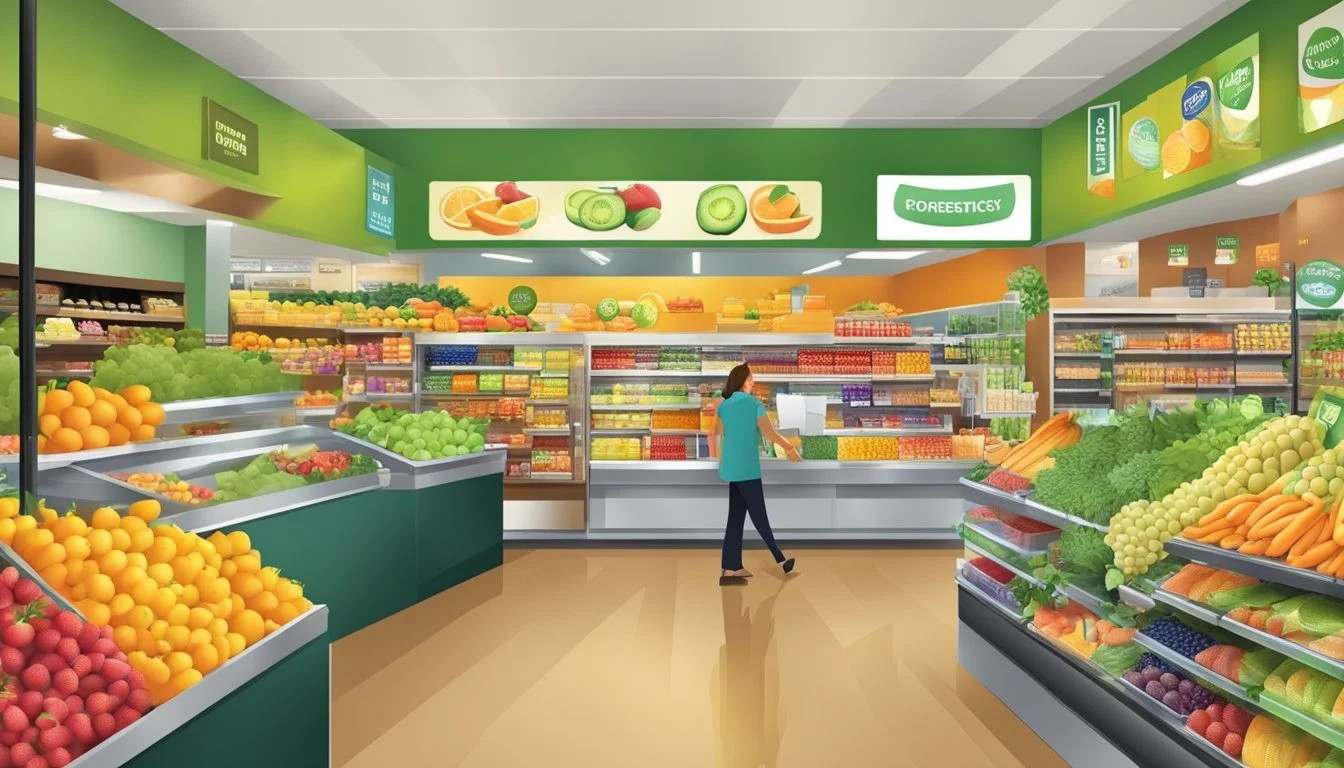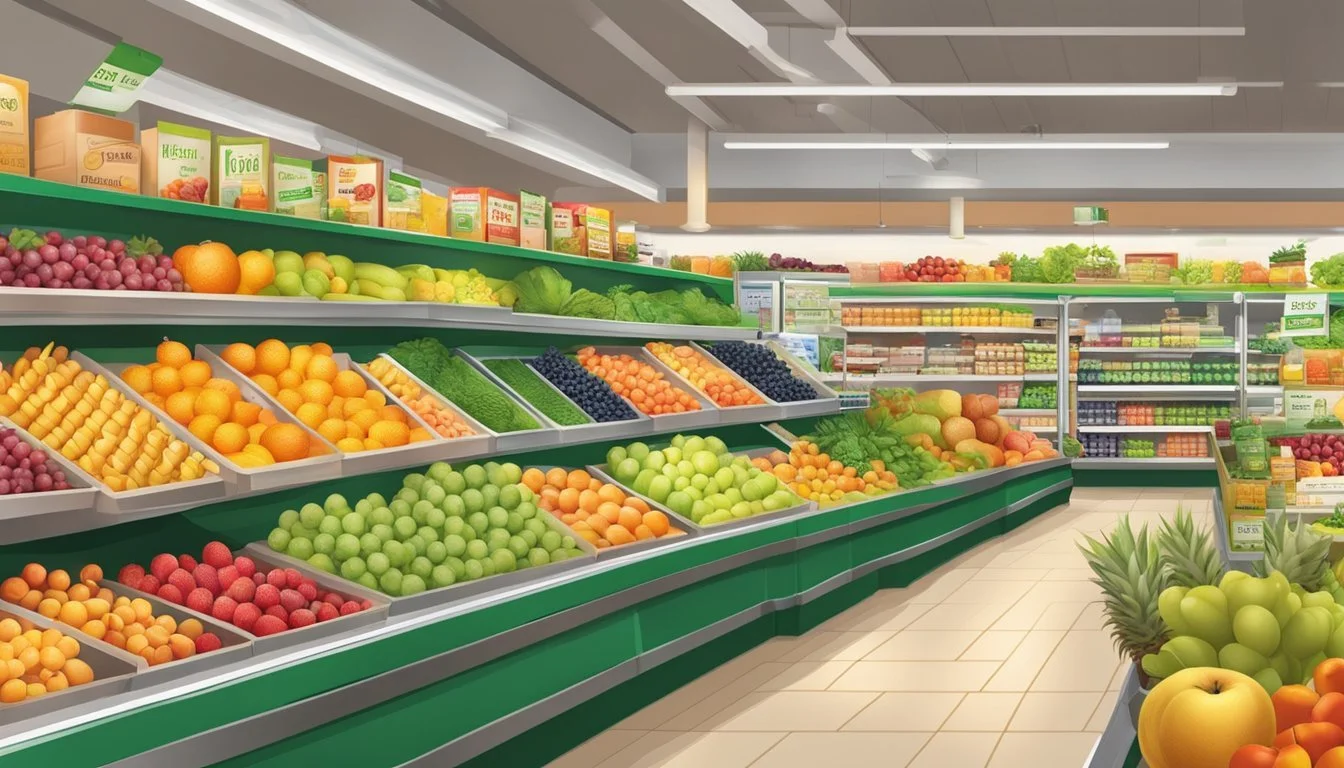Fruit Paradise: Unveiling the Top Grocery Stores for Nature's Sweet Bounty
When it comes to finding the best grocery store for fruit, freshness and quality are paramount. Many shoppers seek out markets that offer a wide variety of ripe, flavorful produce at reasonable prices. Whole Foods consistently ranks as a top choice for its extensive organic and local fruit selection, with about 25% sourced from nearby farms.
Several other grocery chains also excel in their fruit offerings. Central Market impresses customers with its diverse assortment of seasonal fruits, including exotic options alongside familiar favorites. Wegmans garners praise for its fresh-from-the-farm produce and commitment to providing both conventional and organic choices.
While premium stores often lead in fruit quality, some budget-friendly options still deliver. Stores like Trader Joe's offer competitively priced produce that doesn't compromise on taste or freshness. The key is to shop around and find the grocery store in your area that best balances quality, variety, and value when it comes to fruit selection.
Understanding Produce Quality
Produce quality is a critical factor when selecting fruits and vegetables at grocery stores. It impacts nutritional value, taste, and overall satisfaction with purchases.
Importance of Fresh Produce
Fresh produce offers superior flavor and nutrition compared to older fruits and vegetables. Nutrients like vitamins C and E degrade over time after harvesting. Fruits and vegetables lose moisture and become less crisp as they age.
Look for vibrant colors, firm textures, and natural aromas when selecting produce. Avoid items with bruises, soft spots, or signs of mold. Many stores like Whole Foods and Sprouts Farmers Market prioritize freshness, sourcing from local farms when possible.
Proper storage also maintains quality. Keep most produce refrigerated and use within a few days for best results.
Organic vs. Conventional Fruits and Vegetables
Organic produce is grown without synthetic pesticides or GMOs. It may have higher levels of certain antioxidants. Conventional produce is typically less expensive but may contain pesticide residues.
Both organic and conventional fruits and vegetables are nutritious options. Thorough washing helps remove surface residues on conventional items.
Some shoppers prioritize organic for foods with edible peels like apples and berries. Others choose conventional for produce with inedible skins like bananas or avocados.
Many grocery chains now offer extensive organic selections alongside conventional options. This gives consumers more choice based on their preferences and budgets.
Evaluating Grocery Stores
Choosing the best grocery store for fruit requires considering several key factors. Consumer feedback, produce variety, and store type all play important roles in the evaluation process.
Consumer Reports and Surveys
Consumer Reports and other industry surveys provide valuable insights into grocery store performance. These reports often rank stores based on produce quality, freshness, and overall customer satisfaction.
Top-performing stores frequently receive high marks for their fruit selection and quality. Stores like Wegmans, Publix, and Whole Foods consistently rank well in consumer surveys.
Customer reviews on platforms like Yelp and Google can offer additional perspectives on local grocery options. These reviews often highlight specific strengths or weaknesses in a store's produce department.
Variety and Selection in Produce Section
A diverse fruit selection is crucial for meeting customer needs. The best grocery stores offer a wide range of conventional and organic options.
Seasonal variety is another important factor. Top stores adjust their inventory to reflect current harvests and customer preferences.
Some standout features include:
Locally sourced fruits
Exotic or hard-to-find varieties
Pre-cut fruit options
Bulk fruit selections
Stores like Sprouts Farmers Market and Central Market are known for their extensive produce departments and unique offerings.
Supermarket Chains and Independent Grocers
Both large chains and independent grocers can excel in fruit quality and selection. Chain stores often benefit from established supply networks and consistent standards across locations.
Notable chains include:
Whole Foods Market
Trader Joe's
Costco
Independent grocers may offer more locally-sourced options and specialty items. These stores often build strong relationships with local farms and producers.
Some independent stores focus exclusively on produce, providing an extensive fruit selection. Others may specialize in organic or international varieties, catering to specific customer preferences.
Specialty Retailers and Health Food Stores
Specialty retailers and health food stores offer unique selections of fresh fruits and organic produce. These stores cater to health-conscious consumers seeking high-quality, natural options.
Whole Foods Market and Organic Options
Whole Foods Market stands out as a leader in organic and natural foods. The store's produce section features a wide variety of organic fruits, often sourced from local farms. Customers can find rare and seasonal fruits alongside everyday staples.
Whole Foods implements strict quality standards for their produce. They prioritize pesticide-free and non-GMO options. The store also provides detailed information about the origin and growing practices of their fruits.
Many Whole Foods locations offer pre-cut fruit options for convenience. These stores frequently host local farmer markets, allowing customers to connect directly with growers.
Sprouts Farmers Market and Unique Selections
Sprouts Farmers Market specializes in fresh, natural, and organic foods. Their produce department is the heart of the store, offering an extensive selection of fruits.
Sprouts often carries unique and exotic fruits not commonly found in traditional supermarkets. This includes items like dragon fruit, rambutan, and lychee. The store also emphasizes seasonal offerings, ensuring peak freshness and flavor.
Sprouts' layout resembles an indoor farmers market. This design creates an inviting atmosphere for browsing their fruit selection. The store frequently offers sales and promotions on their produce, making healthier options more accessible.
Local Health Food Stores and Community Impact
Local health food stores play a crucial role in supporting community health and local agriculture. These stores often partner with nearby farms to source fresh, seasonal fruits.
Many local health food stores prioritize organic and pesticide-free options. They may offer heirloom varieties of common fruits, providing unique flavors and nutritional profiles.
These stores frequently host educational events about nutrition and sustainable agriculture. By supporting local farmers, they help strengthen the local food system and economy. Customers can often find detailed information about the growing practices and origin of the fruits sold in these stores.
Fruit Variety and Seasonality
Grocery stores offering a wide selection of fruits throughout the year cater to diverse tastes and nutritional needs. The best stores balance seasonal availability with year-round staples, ensuring customers have access to both familiar and unique produce options.
Seasonal Produce Offerings
Top grocery stores adapt their fruit displays to reflect the changing seasons. In summer, berries like blueberries, raspberries, and blackberries take center stage. These antioxidant-rich fruits are perfect for snacking or adding to desserts.
Fall brings apples and pears in numerous varieties. Winter highlights citrus fruits such as oranges, grapefruits, and tangerines. Spring sees the arrival of strawberries and early stone fruits.
Quality stores also source tropical fruits year-round, complementing seasonal local produce. This approach ensures a consistent supply of customer favorites while showcasing the best of each season.
Cultivating a Diverse Fruit Selection
Leading grocers prioritize offering a diverse fruit selection beyond common varieties. This includes stocking exotic or lesser-known fruits like dragon fruit, lychee, or passion fruit.
Some stores feature specialty sections for organic or locally sourced fruits. These areas often include heirloom varieties or unique cultivars not found in conventional produce sections.
Knowledgeable produce staff can guide customers in selecting and preparing unfamiliar fruits. Many stores also provide informational displays or recipe cards to encourage customers to try new fruits.
By offering both staple and unique fruits, grocery stores cater to adventurous eaters and health-conscious shoppers seeking variety in their diets.
Organic Certification and Standards
Organic certification ensures grocery stores meet strict standards for handling and selling organic produce. This process involves rigorous inspections and compliance with USDA regulations.
USDA-Certified Organic Produce
USDA-certified organic produce must be grown without synthetic pesticides, fertilizers, or genetic modification. Farms undergo annual inspections to maintain certification.
Organic items are traced from farm to store, with detailed records kept throughout the supply chain. This guarantees the integrity of organic products for consumers.
Certified organic produce must contain at least 95% organic ingredients. The remaining 5% can only include approved non-organic substances.
Understanding Organic Food Labels
Organic food labels provide crucial information for shoppers. The USDA Organic seal indicates products meet federal organic standards.
"100% Organic" means all ingredients and processing aids are certified organic. "Organic" labels require at least 95% organic ingredients.
Products with 70-95% organic ingredients can use the phrase "Made with Organic Ingredients" but cannot display the USDA Organic seal.
Grocery stores often highlight organic sections to help customers easily identify certified organic produce and products.
Consumer Priorities and Eating Habits
Consumers increasingly prioritize fresh, high-quality fruits and vegetables when selecting grocery stores. This shift reflects growing awareness of the health benefits associated with eating nutrient-rich produce.
Demand for High-Quality Fruits and Vegetables
Shoppers now seek out stores with extensive selections of fresh fruits, including organic options. Many consumers are willing to pay premium prices for top-quality produce.
Whole Foods, known for its wide variety of organic fruits, sources 25% of its produce from local farms. This emphasis on freshness and quality appeals to health-conscious customers.
Central Market features "peak-of-season" produce, offering items like organic seedless grapes from reputable farms. This focus on seasonality and sourcing meets consumer demand for flavorful, nutritious options.
The Impact of Eating Healthy on Grocery Choices
The trend toward healthier eating habits significantly influences where people shop for groceries. Consumers often choose stores based on the quality and variety of their produce sections.
Shoppers increasingly read nutrition labels and seek out fruits high in vitamins and antioxidants. This health-focused approach drives demand for diverse fruit options, including exotic and specialty varieties.
Some grocery chains have responded by expanding their organic fruit selections and highlighting locally-sourced produce. These strategies cater to customers prioritizing freshness, nutritional value, and environmental sustainability in their food choices.
Cost Considerations in Fruit Purchase
Price plays a key role when selecting fruits at grocery stores. Savvy shoppers balance quality and budget while seeking out the best deals on fresh produce.
Balancing Budget and Quality
Fresh Market offers high-quality fruits but often at premium prices. For budget-conscious consumers, stores like Sprouts Farmers Market provide a good compromise between cost and freshness. The USDA projects food costs to stabilize in 2024, but prices will likely remain elevated compared to previous years.
Shoppers can stretch their budgets by focusing on seasonal fruits, which tend to be more affordable when plentiful. Citrus fruits like oranges are typically good value in winter months. Apples and pears offer economical options in fall.
Finding the Best Deals on Fresh Produce
Many grocery chains run weekly specials on select fruits. Shoppers can compare store circulars to find the best prices. Some stores offer loyalty programs or digital coupons for additional savings on produce.
Buying in bulk can reduce per-unit costs, but only for fruits that store well or will be consumed quickly. Frozen fruits provide a cost-effective alternative to fresh, especially for out-of-season varieties.
Farmers markets sometimes offer competitive prices on local, in-season fruits. Shopping near closing time may yield discounts as vendors look to sell remaining stock.
Exploring Regional Grocery Options
Regional grocery chains offer unique selections of fresh produce tailored to local tastes and growing conditions. These stores often source directly from nearby farms, providing customers with high-quality fruits and vegetables.
Southern California Markets
Southern California boasts a diverse array of grocery options known for their exceptional produce. Farmers markets are abundant, offering direct access to locally grown fruits and vegetables. Many of these markets operate year-round due to the region's favorable climate.
New Seasons Market, while originating in the Pacific Northwest, has expanded into Southern California. This chain is recognized for its commitment to organic and locally sourced produce. Their stores feature an impressive selection of seasonal fruits and vegetables.
Specialty produce stores are also common in the area, catering to the region's culinary diversity. These shops often carry unique tropical fruits and rare vegetable varieties not found in larger chain stores.
Midwestern Grocers
The Midwestern region has several standout grocery chains known for their quality produce departments. Meijer, a Michigan-based company, operates large supercenter stores throughout the Midwest. They offer a wide range of fruits and vegetables, including many locally sourced options.
Hy-Vee, headquartered in Iowa, is another Midwestern favorite. Their produce sections are known for freshness and variety. Many Hy-Vee stores feature in-house dietitians who can offer advice on selecting and preparing healthy fruits and vegetables.
Heinen's, with locations in Ohio and Illinois, is praised for its high-quality produce. The chain works closely with local farmers to provide customers with fresh, seasonal options.
Texas-Specific Stores
Texas boasts some of the most beloved regional grocery chains in the country. H-E-B, a Texas institution, is renowned for its produce department. The store offers a wide selection of fruits and vegetables, with an emphasis on Texas-grown items.
Central Market, H-E-B's gourmet offshoot, takes produce even further. Their stores feature extensive selections of organic and exotic fruits and vegetables. Central Market is particularly known for its "peak-of-season" produce offerings.
Fiesta Mart, another Texas-based chain, specializes in international produce. Their stores carry a diverse array of fruits and vegetables popular in Latin American and Asian cuisines, making them a go-to for hard-to-find produce items.
Navigating the Grocery Store for the Best Fruit
Selecting high-quality fruit requires knowledge and attention to detail. Focusing on freshness, ripeness, and local sourcing can lead to more flavorful and nutritious choices.
Strategies for Selecting Fresh and Ripe Produce
Look for fruits with vibrant colors and natural scents. Avoid items with bruises, soft spots, or mold. Gently squeeze fruit to check for firmness - it should yield slightly but not feel mushy.
For berries, inspect the bottom of the container for moisture or mold. Choose fruits that are heavy for their size, indicating juiciness. Bananas with some green are ideal for ripening at home.
Read labels to check harvest dates and country of origin. Fruits picked closer to ripeness often have better flavor. Trust your senses - ripe fruit should have a pleasant aroma.
Identifying Locally Grown and In-Season Fruits
Look for "locally grown" signs in the produce section. Many stores highlight regional farms and products. In-season fruits are typically fresher, more affordable, and have better flavor.
Check store flyers or websites for seasonal produce guides. Farmers' markets are excellent sources for local, in-season fruit. Some grocery chains partner with nearby farms to offer fresher options.
Ask produce staff about local offerings. They can provide information on sourcing and peak seasons. Consider joining a community-supported agriculture (CSA) program for regular local fruit deliveries.
Seasonal eating supports local farmers and provides nutritional variety throughout the year. It also reduces the environmental impact of long-distance transportation.
Brand and Store Loyalty Factors
Brand reputation and customer experience play crucial roles in determining grocery store loyalty for fruit purchases. These factors influence shopper preferences and repeat visits.
Retailer Reputation and Consumer Trust
Walmart's reputation as a low-cost retailer attracts price-conscious fruit shoppers. The company's scale allows for competitive pricing on produce. Hy-Vee builds trust through its focus on fresh, high-quality fruits. Their "Responsible Choice" program highlights sustainably sourced options.
The Fresh Market cultivates an upscale image, appealing to consumers seeking premium fruit varieties. Their curated selection of exotic and specialty fruits sets them apart. Natural Grocers emphasizes organic and non-GMO produce, resonating with health-conscious shoppers.
Transparency in sourcing and clear labeling boost consumer confidence across these retailers.
Exclusive Brands and Private Labels
Many grocers offer private-label fruit products to differentiate themselves. Walmart's "Great Value" brand provides budget-friendly options for common fruits. Hy-Vee's "HealthMarket" line includes organic and specialty fruit items.
The Fresh Market's "TFM" brand highlights unique, gourmet fruit selections. Natural Grocers focuses on its "Natural Grocers Brand" organic produce.
Private labels allow stores to control quality and pricing while fostering loyalty. Exclusive fruit varieties or packaging can make a retailer a destination for specific items.
Customer Service and Shopping Experience
In-store fruit sampling at Hy-Vee and The Fresh Market encourages trial of new varieties. Knowledgeable produce staff at Natural Grocers offer guidance on selection and storage.
Walmart's self-checkout options provide convenience for quick fruit purchases. The Fresh Market's aesthetically pleasing displays enhance the shopping experience.
Online ordering and curbside pickup, offered by most major grocers, cater to time-strapped shoppers. Clear signage, organized displays, and clean environments contribute to positive in-store experiences across retailers.








